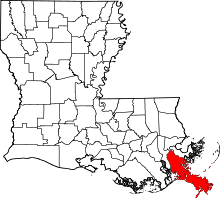Jesuit Bend, Louisiana
| Jesuit Bend | |
| Unincorporated community | |
| Country | United States |
|---|---|
| State | Louisiana |
| Parish | Plaquemines |
| Elevation | 3 ft (0.9 m) |
| Coordinates | 29°44′54″N 90°01′33″W / 29.74833°N 90.02583°WCoordinates: 29°44′54″N 90°01′33″W / 29.74833°N 90.02583°W |
| Timezone | CST (UTC-6) |
| - summer (DST) | CDT (UTC-5) |
| Area code | 504 |
|
Location of Jesuit Bend in Louisiana | |
 Location of Louisiana in the United States | |
Jesuit Bend is an unincorporated community in Plaquemines Parish, Louisiana, United States, on the West Bank of the Mississippi River.
History
Members of the Society of Jesus settled at this location in the early part of the 18th century, a bend in the Mississippi River, hence the name "Jesuit Bend".[1] The Jesuit settlers brought with them from Asia the satsuma, a loosely skinned seedless tangerine. Satsumas have been farmed at this locale ever since.[1]
At one point, Jesuit Bend had a station on the New Orleans, Fort Jackson & Grand Isle Railroad line.[2] Jesuit Bend was also the site of an incident in 1955 when Rev. Gerald Lewis, an African-American Catholic priest, was stopped by parishioners from celebrating Mass there because of his color.[3] The community was thereupon placed under interdict by the Archbishop of New Orleans, Joseph Francis Rummel.[4] This is the location of the Jesuit Bend Wetland Mitigation Bank, an effort to return open water to a fully functioning freshwater marsh, to help reverse the longstanding problem of wetlands erosion in the Mississippi River Delta.
| Wikimedia Commons has media related to Jesuit Bend, Louisiana. |
References
- 1 2 Satsumas WWNO-FM Radio story of October 3, 2009, accessed September 14, 2014.
- ↑ Louisiana in Three Volumes, Alcée Fortier, ed., Century Historical Association, 1914, Vol. 1, page 586.
- ↑ Conciliaria, March 27, 2012 (Accessed August 13, 2014).
- ↑ rs. "Catholics and Jim Crow, Review Essay". jsr.fsu.edu. Retrieved 2016-12-13.
